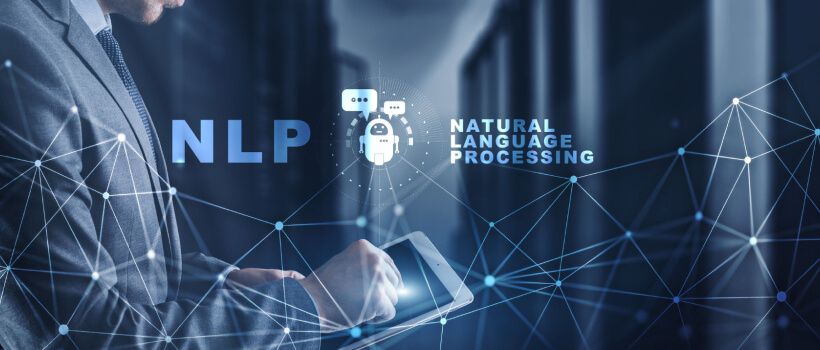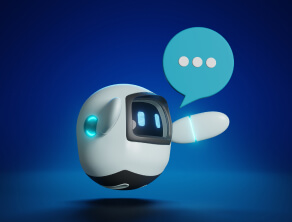NLP in Healthcare: Revolutionizing Patient Care with Natural Language Processing.

Introduction
As the healthcare industry landscape evolves with digital transformation, providers are constantly seeking innovative solutions to navigate regulatory compliance challenges, financial constraints, and the increasing burden on clinicians. One technology that has emerged as a game-changer in this domain is natural language processing (NLP). NLP, a branch of artificial intelligence, is revolutionizing patient care by enabling computers to understand and interpret human language. With its ability to analyze unstructured data from various sources, NLP is transforming healthcare delivery, enhancing clinical decision-making, and improving patient outcomes.
Understanding Natural Language Processing
So what is NLP in healthcare? NLP, or Natural language processing, is the process of using computer algorithms to identify key elements and extract meaning from everyday language, whether it is spoken or written. This interdisciplinary field combines artificial intelligence, computational linguistics, and machine learning to comprehend and interpret human speech. NLP systems can summarize lengthy blocks of text, convert unstructured data into structured fields, answer complex queries, and even engage in optical character recognition and speech recognition.
The Role of NLP in Healthcare
NLP has numerous applications in the healthcare industry, offering tremendous potential to improve patient care and streamline clinical workflows. By translating free text into standardized data, NLP enhances the completeness and accuracy of electronic health records (EHRs), ensuring clinical data integrity. It also enables the extraction of meaningful information from unstructured text, filling data warehouses with valuable insights that can be accessed through user-friendly query interfaces. NLP in healthcare can make documentation easier by allowing providers to dictate their notes, automating the process, and saving valuable time. Furthermore, NLP facilitates computer-assisted coding, which helps providers add detail and specificity to clinical documentation, enhancing coding accuracy and reimbursement.
Unleashing the Power of NLP: Use Cases in Healthcare
1. Clinical Decision Support
One of the most significant benefits of NLP in healthcare is clinical decision support (CDS). By analyzing vast amounts of medical literature, NLP-powered systems like IBM Watson can provide evidence-based recommendations to healthcare providers. These systems can flag patients with specific conditions, identify risk factors, and suggest tailored treatment plans. For example, Watson has been used to identify patients at risk of heart disease and assist in precision medicine and cancer care. NLP’s ability to extract information from unstructured clinical notes allows for a more comprehensive understanding of patient conditions, including social and behavioral factors that may impact their health.

2. Population Health Management
NLP plays a crucial role in population health management by aggregating and analyzing data from various sources. By extracting relevant information from clinical notes, lab reports, and other textual documents, NLP enables risk stratification and identifying patients who may benefit from specific interventions. This information can be used to develop targeted care plans, monitor disease progression, and improve overall population health outcomes.
3. Clinical Research and Drug Development
NLP in healthcare is transforming the landscape of clinical research and drug development by extracting valuable insights from vast medical literature. NLP-powered systems can analyze research papers, clinical trials, and case studies to identify relevant information, potential drug interactions, and adverse events. This accelerates the research process, helps identify new treatment strategies, and contributes to evidence-based medicine.
4. Patient Engagement and Education
By providing tailored and easily understandable health information, NLP can support patient engagement and education. NLP can identify patient needs, concerns, and preferences by analyzing patient-generated data, such as social media posts or online forums. This enables healthcare providers to deliver personalized education materials, improve patient communication, and foster shared decision-making.
5. Clinical Documentation Improvement
NLP in healthcare can significantly improve clinical documentation by automating coding, extracting relevant information, and ensuring accurate and complete documentation. By analyzing clinical notes and extracting key concepts, NLP systems can identify missing or incorrect information, improving coding accuracy, billing processes, and reimbursement.
6. Telemedicine and Virtual Assistants
With the rise of telemedicine and virtual healthcare, NLP is becoming increasingly important in facilitating remote patient consultations. NLP-powered virtual assistants can understand and respond to patient queries, provide relevant medical information, and assist healthcare providers in delivering remote care. This technology enhances the patient experience, increases access to healthcare, and improves overall efficiency.

Overcoming Challenges and Looking Ahead
While NLP holds immense promise in healthcare, there are still challenges to overcome. One significant obstacle is the complexity of clinical language and the need to disambiguate terms and phrases. Additionally, privacy and security concerns surrounding patient data must be addressed to ensure the ethical use of NLP technology. However, as advancements continue in artificial intelligence and machine learning, the future of NLP in healthcare looks bright.
As healthcare providers strive to deliver patient-centric, efficient, and evidence-based care, NLP emerges as a powerful tool to unlock the potential of vast amounts of data. By leveraging NLP, healthcare organizations can enhance clinical decision-making, improve population health management, and deliver personalized patient care. NLP is not just a technological advancement; it is a transformative force in revolutionizing patient care and shaping the future of healthcare.
Note: The information provided in this article is for informational purposes only and should not be considered medical or legal advice. Consult a qualified healthcare professional or legal expert for specific healthcare-related queries or concerns.
Also Read: All You Need to Know about Healthcare Technology.
![Blog-[x]cube LABS](https://d6fiz9tmzg8gn.cloudfront.net/wp-content/uploads/2016/06/blog_banner.jpg)






